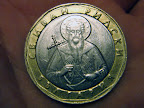John of Rila (876-946) was a monk and hermit who lived for twelve years alone, among the wild beasts, in the caves and in the hollow of a tree. He later settled in the depths of the mountains Rilski. But over time, people still found it. They came to John with their concerns, and he prayed for them, healing the sick, casting out evil spirits and teaching spiritual instruction for right living. So the monk appeared followers - disciples, who founded the Rila Monastery
Shortly before the death of John of Rila wrote to his disciples, "Testament", in which he called to store the holy faith and avoid the false and wicked doctrines..
Abstain from worldly interests carefully and always remember why you came out of the world, and why you have ignored all worldly.
John said that the love of money is the root of all evil and idolatry.
Because for the hermit is not wealth in gold and silver, but in abject poverty, the rejection of svovevoliya, and in deep humility.
John emphasizes that it is not his commandments, and Christ, who said to his disciples, and through them to all those who renounced the world:
Do not possess neither gold, nor silver, nor brass in your purses, nor scrip for your journey, neither two coats, neither shoes, nor yet staves: for the workman is worthy of his meat.
(Matthew 10)
John assured that God will never leave us, in hardships, but will give everything you need for life. But the devil, wanting to destroy our soul, will do its best to tempt us.
For from the beginning, when I came into this wilderness, the cunning enemy tried to tempt me pious king sent me a lot of gold. For God's sake, I refused to see him, because I knew it Thu machinations of Satan. I did not take, but sent it to those who sent him, because I thought, "If I wanted to have gold and silver things, and the like, why would I come to this terrible and impenetrable wilderness, where I do not found the people, but only the wild beasts? So I saved myself from the machinations of the crafty adversary...
John encourages students to unity, to the love between them, and warns against attempts to rise above the other.
who wants to be the first to be last of all and servant of all. (Gospel of Mark, 9)
John, who was educated at the monastic life and read in Greek works of the Holy Fathers, tells the teacher Ephrem the Syrian (IV century)
:
...if all you wish for power and start to dominate, and all want to be in charge, and all - teachers, as well as legislators and teachers, and between you increase competition, quarrels, disputes, jealousy, gossip, arrogance, jealousy, and other passions, you know, that Christ is not among you, for Christ is not a teacher of discord and dissension, but of peace and unity.
Those who sow discord, strife and temptations, the ascetic izganyat commands from their collections so they do not cause more damage to everyone.
Finally John advises Bart learn more works of the Holy Fathers, and comply with established rules of the Church, as well as to promote new converts to increase faith and help them to get rid of pagan rituals, obscene and evil customs, they hold even after the adoption of the holy faith. Because they do it out of ignorance, because it is necessary to bring it to them.
Fully read "Testament John of Rila" here (in Bulgarian)





